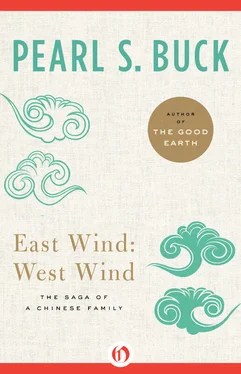“Ah, he is like his father when first we loved!”
Then my brother went across the seas, and I did not see him again. He became indistinct in my mind and dimmed by all the strangeness surrounding him, so that I have never again seen him clearly.
Sitting in my room, awaiting my husband’s return, with the letter from my mother in my hand, I perceived that my brother was a strange man whom I did not know.
When my husband came home at noon I ran to him weeping, the letter in my outstretched hands. He received me with surprise, saying,
“But what is this? But what is this?”
“Read this — read and see!” I cried, and fell to sobbing afresh to see the look on his face as he read.
“Stupid boy — foolish — foolish!” he muttered, crumpling the letter in his hand. “How could he do this thing? Yes, go at once to your honorable mother. You must comfort her.”
And he bade the servant tell the ricksha man to hasten his meal that I might lose no time. When the man was ready then, I took only the child and his attendant and besought the man to run quickly.
When I had entered the gate of my mother’s house I perceived at once the silence of heaviness over all, as a cloud dims the moon. The slaves went about their business rolling their eyes and whispering, and Wang Da Ma, who had returned with me, had wept as we passed through the streets until her eyelids were thickened with tears.
In the Court of the Drooping Willows, the Second and the Third Ladies sat with their children. When I entered with my son they could scarce give me greeting before they fell to questioning me eagerly.
“Ah, the fair child!” cried the plump Second Lady, laying her pretty fat fingers against my son’s cheek and smelling his little hand in caress. “A little sweetmeat, thou! — Have you heard?” She turned to me with important gravity.
I nodded. I asked,
“Where is my mother?”
“The Honorable First Lady has remained in her chamber these three days,” she replied. “She speaks to no one. There she sits in her chamber. Twice daily she comes forth into the outer room to command the ordering of the household and to give out rice and food. Then she returns again to her chamber. Her lips are set together like the lips of a stone image, and her eyes make us turn away. We dare not speak to her. We do not know her thoughts.
“You will tell us what she says to you?” She coaxed me with nods and smiles, but I shook my head, refusing her curiosity. “At least leave us the little precious to play with,” she added.
She stretched out her arms for my son, but I forbade it.
“I will take him to my mother,” I said. “He will cheer her and turn her mind outward from her distress.”
When I had passed through the guest hall into the Court of Peonies and then through the women’s leisure room, I paused before my mother’s apartments. Usually only the red satin curtain hung in this doorway, but now behind the curtain the door was closed. Then I struck lightly upon it with the palm of my hand. There was no answer. I struck again. It was only when I called,
“It is I, my mother! It is I, thy little child!” that I heard her voice coming as from a great distance,
“Come to me, my daughter.”
Then I went in. I saw her sitting beside the black carved table. Incense was smoldering in the bronze urn before the sacred writing on the wall. She sat with bowed head, and between the fingers of one drooping hand she held a book. When she saw me enter she said,
“You have come? I have been trying to read the Book of Changes. But I find nothing to-day in its pages to comfort me.” She shook her head a little vaguely as she spoke, and the book dropped upon the floor. She let it lie there.
The irresolution of the action alarmed me. My mother has ever been self-possessed, sure, restrained. Now I saw that she had been too long alone, I reproached myself that I had loved my son too well and that his father’s tenderness had comforted me too deeply and too long. It had been many days since I came to visit her. How could I rouse her and divert her thoughts? I took my son and placing him on his fat legs, I folded his little hands and made him bow before her. I whispered to him,
“Thy honored Old One — say it, child!”
“Old One!” he lisped, staring at her unsmiling.
I told you that she had not seen him since his third month, and you know, My Sister, how he is altogether beautiful! Who could resist him? Her eyes fell on him and lingered. She roused herself. She went to the gilded cupboard and took out a red lacquered box. She opened it, and within were tiny cakes covered with sesame seed. These she gave to him, filling his hands. When he saw them he laughed aloud, and she indulged him with faint smiles and said,
“Eat, my little lotus-pod! Eat, my little meat-dumpling!”
Seeing her thus momentarily diverted, I picked up the book and poured a bowl of tea from the pot on the table, and presented it to her in both my hands.
She bade me sit, then, and the child played upon the floor, and we watched him. I waited for her to speak, not knowing whether or not she wished to mention the matter of my brother. She did not immediately approach it. She said first,
“Your son is here, my daughter.”
I remembered then the night when I had told her of my grief. Now the joy of the morning had come.
“Yes, my mother,” I replied, smiling.
“You are happy?” she asked, her eyes still on the child.
“My lord is a prince for his grace to me, his humble wife,” I replied.
“The child is conceived and born as from perfection,” she said musingly, her eyes upon him. “In everything I observe he is ten parts and complete. There is no beauty left to desire in him. Ah—” She sighed and stirred restlessly. “Your brother was such a child! I wish that he had died then, that I might have remembered him as beautiful and filial!”
I understood therefore that she wished to speak of my brother. But I waited to perceive the direction of her thoughts more clearly. In a little while she spoke again, raising her eyes to mine,
“You had my letter?”
“My mother’s letter reached me this morning by the hand of the servant,” I replied, bowing.
She sighed again, and rising, she went to the drawer of the writing-table and drew forth yet another letter. I stood and awaited her return. When she gave me the letter I received it with both hands. She said,
“Read it.”
It was from a friend of my brother’s, surnamed Chu, with whom he had gone to America from Peking. At the request of my brother, the letter said, he, Chu Kwoh-ting, was writing to the honored Old Ones to tell them that their son had betrothed himself according to the western custom to the daughter of one of his teachers in the university. He, their son, sent his filial respects to his parents and begged them to break off the early betrothal with the daughter of Li, which had always made him unhappy, even in contemplation. He acknowledged in all things the superior virtue of his parents and their endless kindness to him, their unworthy son. Nevertheless he wished to say clearly that he could not marry the one to whom he had been betrothed according to Chinese custom, because the times had changed; he was a modern man, and he had decided to adopt the modern, independent, free method of marriage.
The letter closed with many formal and filial expressions of respectful affection and obedience. But none the less the determination in my brother’s heart was written plainly forth. He had asked his friend to write for him only because he wished to spare his parents and himself the embarrassment of direct defiance. My heart burned against him as I read the letter. When I had finished it I folded it and handed it back to my mother without speech.
Читать дальше











